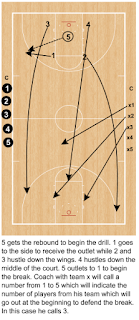Building Mental Toughness in Basketball: A Coach’s Guide
Every coach wants a team that’s not just talented, but mentally tough — the kind of team that stays composed under pressure, bounces back after mistakes, and competes no matter what’s on the scoreboard.
But mental toughness isn’t something players are born with. It’s built every day through habits, challenges, and the example we set as coaches. Here’s how you can develop a stronger, more resilient team from the inside out.
1. Set Standards, Not Just Rules
Mental toughness starts with clear expectations.
Create team standards for effort, attitude, and body language — and hold everyone accountable, from your top scorer to your last sub.
Instead of rules like “no complaining,” set standards like:
“We sprint to help on defense.”
“We never hang our heads after mistakes.”
When players know exactly what’s expected, they learn consistency — and consistency builds confidence.
2. Make Practice Harder Than the Game
Adversity should live inside your practice gym.
Create drills that build focus and resilience:
-
Score-pressure situations: Down 3 with 20 seconds left.
-
Consecutive stops: Three defensive stops or you run.
-
Fatigue moments: Finish practice with slides or sprints before a shooting drill.
You’re not punishing — you’re training composure under stress. When the real game gets tough, your team will already be prepared.
“Pressure doesn’t break us — it reveals us.”
3. Build a Growth Mindset Culture
Mental toughness thrives in a growth mindset environment.
Replace “I can’t” with “I can’t yet.”
Celebrate effort, communication, and recovery from mistakes — not just stats or highlights.
After losses, shift the conversation from “what went wrong” to “what did we learn?”
When your players see challenges as chances to grow, they become fearless learners.
4. Use Reflection and Visualization
At the end of practice, take two minutes to reflect:
-
“What moment tested me most today?”
-
“How did I respond when I felt frustrated?”
Add visualization exercises — have players picture themselves knocking down free throws, staying locked in on defense, or responding to adversity with confidence.
The mind doesn’t know the difference between real and imagined reps — both build readiness.
5. Build Team Communication and Trust
Mentally tough teams talk through chaos.
Teach constant communication: on switches, on screens, after mistakes.
Promote “next play” language:
“We got this.”
“Next one.”
“Together.”
When players trust and talk, their mindset shifts from me to we. That’s real toughness.
6. Model Composure as a Coach
Your players mirror your emotions.
If you stay calm in chaos, they will too.
Use every challenge as a teachable moment:
“That’s adversity — now let’s respond.”
You don’t have to yell to get through. Lead from the middle — steady, composed, confident.
7. Teach Resilience After Mistakes
Every player will mess up. What matters is how they respond.
Develop a mistake ritual — something small to reset:
-
Clap it out
-
Tap your chest and say “my bad”
-
Take one deep breath
Give them permission to fail forward. The best players have short memories — they move on fast.
8. Compete Every Day
Create competition in everything you do:
-
1-on-1 finishing drills
-
Rebounding challenges
-
Shooting games
-
Defensive stop competitions
Keep score. Make it matter.
Competing builds pride, focus, and emotional control. Players learn to fight for every point, even in practice.
9. Focus on Process Over Outcome
The best teams chase habits, not headlines.
Reward what doesn’t show up in the box score:
-
Talking on defense
-
Diving for loose balls
-
Sprinting back in transition
Mental toughness is built through process, repetition, and standards, not just highlight plays.
10. Teach Emotional Control
Help players understand their emotions before the game controls them.
Ask questions like:
-
“What happens to your body when you get frustrated?”
-
“What’s your reset when that happens?”
Teach breathing resets — two deep breaths, eyes up, refocus.
The mentally tough player slows the game down when everyone else speeds up.
Final Thoughts
Mental toughness isn’t about acting tough — it’s about staying steady when the game isn’t going your way.
As a coach, you build it by modeling composure, creating challenge, and teaching your players how to respond — not react.
“We train our minds like we train our jump shots — every day, with intention.”



Comments
Post a Comment